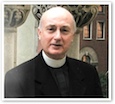A right use of intellect and will
- FATHER GEORGE W. RUTLER
All creation emanated from the voice of God uttering: "Let there be light."
 There was nothing and no one yet to hear it, only God himself. As animate creatures came into being, they were able to make sounds, and some of them are beautiful, but only human beings have the gift of being able to consciously praise God by a right use of intellect and will. One of the Advent mysteries is "Judgment" and, in addition to our Creator's assessment of us, it includes the use of speech as a correct expression of human dignity. To "take the Lord's name in vain" does not diminish God, who is eternal, but it does corrupt our dignity in relation to him as his sons and daughters. Poor Job's wife knew this when she told him, albeit ill-advisedly, "Curse God and die!" (Job 2:9).
There was nothing and no one yet to hear it, only God himself. As animate creatures came into being, they were able to make sounds, and some of them are beautiful, but only human beings have the gift of being able to consciously praise God by a right use of intellect and will. One of the Advent mysteries is "Judgment" and, in addition to our Creator's assessment of us, it includes the use of speech as a correct expression of human dignity. To "take the Lord's name in vain" does not diminish God, who is eternal, but it does corrupt our dignity in relation to him as his sons and daughters. Poor Job's wife knew this when she told him, albeit ill-advisedly, "Curse God and die!" (Job 2:9).
If we use profane language, our Creator does not wash our mouths with soap, but he becomes less accessible to us. "Profane" actually means "outside the temple." Our culture is degraded by an increasing use of vulgar speech. There are plenty of artful ways to insult, but when script writers and stand-up comedians resort to coarseness, they reveal their lack of verbal skill, not to mention their lack of self-respect. It is worse for a woman to use vulgar language than for a man. If this is a double standard, it is so in a good sense, for by nature the female is meant to civilize the male. Invoking Eusebius of Nicomedia, and Aristotle before him, "The corruption of the best is the worst."
Cole Porter remarked on this degradation even back in 1934 in a somewhat insouciant way: "Good authors, too, who once knew better words, / Now only use four-letter words. / Writing prose, / Anything goes."
One way to discipline the use of speech is to make a quiet act of reparation when someone curses. Simply utter to yourself the holy name of Jesus. Save for the angels, we are the only creatures who can do that.
While Advent hymns are often blocked out by Christmas music sung too early, they are among the Church's most beautiful sounds, giving voice to the anticipation of Christ's birth and the prospect of his Second Coming. Among them is one translated by Edward Caswall, an Oxford classics scholar who converted to Catholicism in 1847 and joined John Henry Newman's Oratory in Birmingham three years later. There is nothing in his vocabulary that needs to be bleeped or asterisked, although such speech may confuse and even scandalize those in our present day who grunt like animals instead of singing like humans, who are — after all — only a little lower than the angels:
Hark! A thrilling voice is sounding;
"Christ is nigh," it seems to say;
"Cast away the works of darkness,
O ye children of the day!"
 This is Meaghen Gonzalez, Editor of CERC. I hope you appreciated this piece. We curate these articles especially for believers like you.
This is Meaghen Gonzalez, Editor of CERC. I hope you appreciated this piece. We curate these articles especially for believers like you.
Please show your appreciation by making a $3 donation. CERC is entirely reader supported.

Acknowledgement
 Father George W. Rutler. "A right use of intellect and will." From the Pastor (December 9, 2018).
Father George W. Rutler. "A right use of intellect and will." From the Pastor (December 9, 2018).
Reprinted with permission from Father George W. Rutler. Photo by Daria Tumanova on Unsplash.
The Author
 Father George W. Rutler is the pastor of St. Michael's church in New York City. He has written many books, including: The Wit and Wisdom of Father George Rutler, The Stories of Hymns, Hints of Heaven: The Parables of Christ and What They Mean for You, Principalities and Powers: Spiritual Combat 1942-1943, Cloud of Witnesses — Dead People I Knew When They Were Alive, Coincidentally: Unserious Reflections on Trivial Connections, A Crisis of Saints: Essays on People and Principles, Brightest and Best, and Adam Danced: The Cross and the Seven Deadly Sins.
Father George W. Rutler is the pastor of St. Michael's church in New York City. He has written many books, including: The Wit and Wisdom of Father George Rutler, The Stories of Hymns, Hints of Heaven: The Parables of Christ and What They Mean for You, Principalities and Powers: Spiritual Combat 1942-1943, Cloud of Witnesses — Dead People I Knew When They Were Alive, Coincidentally: Unserious Reflections on Trivial Connections, A Crisis of Saints: Essays on People and Principles, Brightest and Best, and Adam Danced: The Cross and the Seven Deadly Sins.




